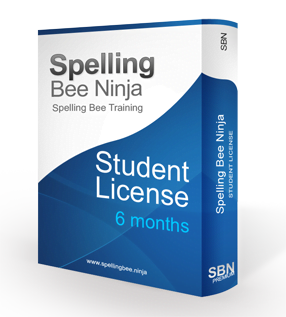The US Annual Spelling Bee contest, also known as Scripps Spelling Bee contest, is held each year in late May/early June. Dating back to 1925, the use of word bee in “Spelling Bee” is a reference to “gathering”, in which a healthy sense of competition and learning is instilled in the participants. The goal is to develop a deeper understanding of English language and enhancing their vocabulary. Similar competitions are held all over the world under different names. Now the main question arises; how to win spelling bee? How to win this prestigious contest?
It is usually observed that participants will keep cramming as many words as they can, mistaking it for hard work.
The trick is to work smart and develop a proper preparation plan to win spelling bee.
Moreover, the concept of phonetics is of significant importance in this case since there exist alternate pronunciations of one word (e.g. tomato).
Spelling Bee isn’t merely a test of your memory, but rather there is analytical thinking involved.
The 2017 winner who win spelling bee contest from California, Ananya Vinay, shared her thoughts with the interviewer.
She took this contest as a learning opportunity- learning about medicine, geography, science, literature etc. This would help her in choosing a field of study/career path when comes the time. While preparing and learning her words, she always looked for the following:
The language of origin of the word i.e. which language the word comes from.
Roots of the word i.e. German, Russian, Latin, Italian etc.
Definition of the word i.e. what does the word mean, where is it used, how is it used etc.
Part of speech – whether the word is a verb, noun, adjective, adverb etc.
The 2016 Spelling Bee runner-up, Rohan Rajeev, thinks that getting to the finals of this competition isn’t all about the inborn talent in a person- instead, anyone can do it through hard work, patience and determination. They key is to do the following things:
Learn the language pattern – which words have non-English origins, which words have Greek/French etc. shadow on them. For example, karyokinesis is made from two Greek words Karyo (meaning nucleus) and Kinesis (meaning division)
Learn the language roots– if a difficult word comes up, look for the most basic part of it that explains the semantics of the whole word stems from the root word. For example, the word “chatter” stems from the word “chat”
The joint winners of 2016 who win Spelling Bee contest – Siriram Hathwar and Ansun Sujoe both play music in their free time, the former plays piano and the latter plays guitar. They suggested that the following things helped them in winning the competition:
Comprehensive reading of dictionary– dividing the 26 letters on 12 months, each day you have to learn and new word with its pronunciation, definition and its language roots
Flashcards help a lot in preparing for the spelling bee- the face with the word and the rear side with the definition and pronunciation, with our spelling bee search engine you have cards for every English word, along with spelling bee analytics.
Focusing on vocabulary– don’t impress upon learning the spellings only. Learn the complete word in all aspects so that you may remember it and its correct use, along with correct pronunciation
Once you’ve built your vocabulary, start with the spellings. Think analytically- where does the word come from, does it have any constituents, where can the word be used?
Apart from the pieces of advice from the specified winners and the runners-up many other champions have repeatedly mentioned the tips to gear oneself for the Spelling Bee preparation, and we have compiled them for you here:
Table of Contents
Step 1- READ
Read read and read again: Reading is important; not only for win spelling bee but because it is one of the best things you can do for your education.
Get your hands on anything you can find.
Do not confine yourself to word lists and course books.
Read medical journals, engineering magazines, old English literature, cross-language articles
Know what you’re reading.
Keep a dictionary by your side so that whenever there is a difficult word, you can look for its meaning and usage.
Keep searching for the most difficult and complex words in the English language.
Work hard, work smart, but do not overburden yourself with the reading.
- Check this article on how to increase your fluency when reading.
Step 2: TEST
Prepare flashcards– write the words and their meanings.
Keep testing yourself by asking your family and friends to read off difficult words from the flashcards.
Write as much as you can, since studies reveal that written things are often remembered better than the heard ones.
Keep a check on your scores, never settle for anything than par excellence.
Do not give in to failure – if you flunk, then start learning again. This will make your learning more refined.
Step 3: Word Lists & Planning
Divide the 26 letters in 13 months – designating 2 letters to each month.
Learn the most difficult words first. It doesn’t matter if you fail since failure is a stepping stone to success.
Divide the words on the basis of their difficulty level: Easy, Medium, Hard and Extreme.
Keep a check on the words you misspell.
Always double check the words you have spelled.
Words from other languages can be a hard nut to crack- the trick is to learn their roots.
Consolidate a list of high-frequency words.
Step 4: Word Rules
Some of the common word rules are stated below:
I before E except after C unless it sounds like A
English words do not end in V or J
Q always needs U
Y changes to I when added suffix starts with E
Al- is a prefix written with one L when preceding another syllable
-Ful is a suffix written with one L when added to another syllable
Develop an understanding of how foreign words are incorporated into the English language.
Develop an understanding of major foreign languages’ patterns.
Step 5: Don’t Hesitate
To ask your friends and family for help.
In putting extra effort.
To find the best possible learning method – no matter how strange it seems, it is fine as long as it’s helping you.
To know your strength and weakness and to seek out guidance for constant improvement.
Step 6: Technological Aid
Surf the Internet as much as you can for spelling improvements.
Download spelling related fun games and applications, here you have our Spelling Bee Ninja
Learn from the participants’ mistakes, since a wise person learns from the mistakes other people make.
Join spelling bee forums on social media, interact with other aspirants and share your knowledge.
Try the aforementioned steps and you’ll surely do well in your contest. Fortune always favors the brave. Read as much as you can, sheer hard work and determination can sometimes work miracles. Here’s to hoping that your spelling bee experience would be supercalifragilistic expialidocious.
Get Spelling Bee Ninja
 Get a Spelling Bee Ninja account: the number one and only professional spelling bee training system.
Get a Spelling Bee Ninja account: the number one and only professional spelling bee training system.
This system will help you to increase your spelling skills in no time, dramatically increasing the chances to win Spelling Bee contests.
You may want to check out these Spelling tutorials to get more information on how to win spelling bee:
Spelling Bee Practice Tutorial – All you need to know


